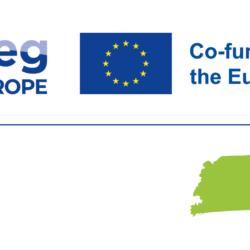


Deutsch | English
The project, initiated and coordinated by the Joint Spatial Planning Department Berlin-Brandenburg (GL) as lead partner, aims to support Central European regions in integrating hydrogen into regional energy planning.
The transnational Interreg B project, which is being implemented in the Central Europe programme area in the 2021-2027 funding period, is assigned to the funding priority ‘Supporting the energy transition to a climate-neutral Central Europe’.
Total funding of €2.39 million is available for the project, which will run for three years from April 2023 to March 2026. The ERDF funding amounts to 80%. The project consortium consists of twelve partners from seven countries (Germany, Poland, Austria, the Czech Republic, Slovakia, Italy and Croatia).
H2CE is dedicated to the regions‘ common challenge of introducing intelligent solutions for the integration of hydrogen and renewables into the regional energy transition. The objective is to enable the project partners to proactively manage and support the energy transition, improve their cooperation with industry and project organisers and thus contribute to accelerating the ramp-up of the regional hydrogen economy.

The project aims to equip regional authorities and administrations with the skills to establish the right framework conditions. To this end, transnational cooperation will develop decision-making tools and solutions that can be integrated into regional planning.
‘Hydrogen readiness’ is to be understood as the acquisition of competences, regardless of whether the topic of hydrogen is already of key importance or does not yet play an essential role. H2CE enables the participating regions to better assess the regional potential of hydrogen.
The first work package is dedicated to the hydrogen readiness of the regions in the narrower sense, i.e. the participating regions carry out an analysis of the significance of hydrogen in terms of energy management and planning, which provides them with the basis for a hydrogen strategy or action plan. The regions are supported in this process by means of developed guidelines. In some of the participating regions, strategies and action plans will be developed as part of the project. Furthermore, in this work package the strategic approach will be raised from the regional level to a transnational level. The development of a transnational hydrogen strategy for the participating regions concludes the scope of this work package.
The second work package deals with the development and testing of support mechanisms for the integration of hydrogen into regional and local energy systems. The focus is on how authorities and institutions involved in regional energy planning can initiate and implement such support processes. The support mechanisms range from the development and testing of energy cell models and participatory approaches to build up the technical expertise of stakeholders to instruments designed to create incentives for exploiting the regional potential of hydrogen. This includes a GIS-based tool that summarises the hydrogen activities in a region and thus supports decision-makers and stakeholders in their work.
The concluding third work package, building on the previous work packages, addresses the networking of Central European regions working on ‘hydrogen readiness’ and the knowledge transfer of solutions developed at regional, interregional and transnational level. To this end, an interactive platform will be created that can be used by any interested region even after the project has ended. This will institutionalise the network of ‘hydrogen-ready regions in Central Europe’ created by the project.
Further information on the project is available on the project website of the Interreg B Programme Central Europe:
The GL initiated this project because of the potential of green hydrogen as part of the energy transition for the planning regions of the capital region. The project also contributes to the goal of the Scandria®Alliance (coordinated by the GL) to generate stimuli for spatial development in the capital region through transnational cooperation along development corridors.
In addition to the overall coordination of the project, the GL has taken over the management of the first work package. With the technical support of a research institute, it is developing the project’s summary of the analyses from the regions involved in the project partnership, the guidelines for the development of regional hydrogen strategies and action plans and, finally, a transnational strategy.
The project can support the existing hydrogen strategies, action plans and studies on potential for Berlin, Brandenburg and the Brandenburg regions in their implementation from a regional planning perspective. Various planning regions and regional networks of hydrogen stakeholders will be actively involved and associated in the project work. In doing so, the GL is pursuing the objective of creating synergies with the ongoing energy policy and planning processes in the capital region and is focussing on knowledge transfer through transnational cooperation in Central Europe. This also specifically applies to cooperation in the German-Polish interconnection area.
The Prignitz-Oberhavel planning region is represented in H2CE by project partner REG Regionalentwicklungsgesellschaft Nordwestbrandenburg and will develop a hydrogen action plan as part of the project. A study on hydrogen potential carried out in 2023 has already laid the foundation for the action plan.
Stadt- und Überlandwerke Lübben (Spreewald) is another Brandenburg partner in the project. As part of the project, the municipal utilities are developing an energy cell model that can be transferred to other regions in Brandenburg as well as to other local authorities throughout Central Europe.
As lead partner, the GL is also working towards an efficient transfer of knowledge by participating in state-wide networking activities in Berlin and Brandenburg and organising specific events as part of the project, including a final event.
The GL is also an associated partner in other hydrogen projects in INTERREG B programmes: HyEfRe (Central Europe) and HyTruck (Baltic Sea region).